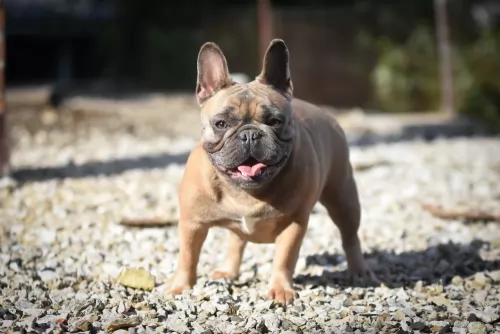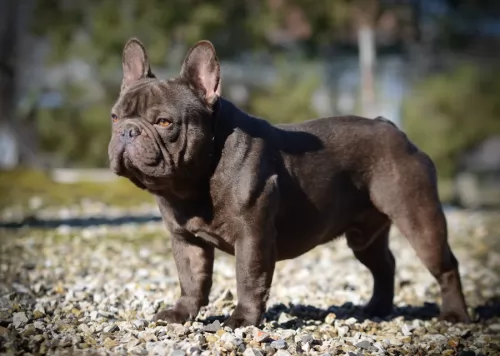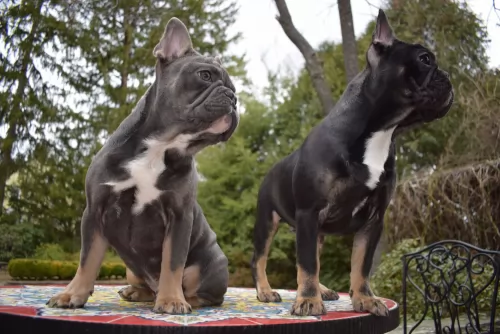 Petzlover
Petzlover French Bulldog is originated from France but Puggle is originated from United States. Both French Bulldog and Puggle are having almost same height. Both French Bulldog and Puggle are having almost same weight. French Bulldog may live 3 years less than Puggle. Both French Bulldog and Puggle has almost same litter size. French Bulldog requires Low Maintenance. But Puggle requires Moderate Maintenance
French Bulldog is originated from France but Puggle is originated from United States. Both French Bulldog and Puggle are having almost same height. Both French Bulldog and Puggle are having almost same weight. French Bulldog may live 3 years less than Puggle. Both French Bulldog and Puggle has almost same litter size. French Bulldog requires Low Maintenance. But Puggle requires Moderate Maintenance
 The french bulldog originated in England and are bred expecting small size bulldogs. Many lace workers in Nottingham had little bulldogs and when they emigrated to france, they brought their dogs with them. Soon they become popular in France and Europe. Then Americans showed interest in them.In 1896 frenchie was shown in United states in a show and after that they got their nickname "Frechie".
The french bulldog originated in England and are bred expecting small size bulldogs. Many lace workers in Nottingham had little bulldogs and when they emigrated to france, they brought their dogs with them. Soon they become popular in France and Europe. Then Americans showed interest in them.In 1896 frenchie was shown in United states in a show and after that they got their nickname "Frechie".
 The first Puggle was bred in the United States in the 1980s and was registered with the American Canine Hybrid Club.
The first Puggle was bred in the United States in the 1980s and was registered with the American Canine Hybrid Club.
None of the major kennel clubs recognize Puggles as a dog breed. The Puggle is a mix between the Pug and the Beagle, and is essentially a companion dog. Both the parent dogs are popular pets and each of the dogs - the Pug and the Beagle have their own histories.
 Frenchie is a good companion dog and has a powerful muscular body. They like to play but also likes to relax for more time. They are intelligent and training them is very easy until they think it a game. They are free thinkers and are not very good in obedience. Frenchies should not be leaved alone for a long time.They love spending time with humans and generally they get along with everyone. They are excellent watchdogs and alerts when strangers come.
Frenchie is a good companion dog and has a powerful muscular body. They like to play but also likes to relax for more time. They are intelligent and training them is very easy until they think it a game. They are free thinkers and are not very good in obedience. Frenchies should not be leaved alone for a long time.They love spending time with humans and generally they get along with everyone. They are excellent watchdogs and alerts when strangers come.
French bulldog suits very well in apartments. But they should be made to walk for fifteen minutes daily to avoid over weight. They should not be kept outside on hot days. Frenchies will be very happy if you stay in home. They will follow you wherever you walk inside the house. They love people so much, such that people who own a Frenchie can not imagine life without them.
 The Puggle isn’t a purebred and he has short legs, a fairly thickset body, a crooked tail and medium length, floppy ears.
The Puggle isn’t a purebred and he has short legs, a fairly thickset body, a crooked tail and medium length, floppy ears.
The Puggle’s coat is short and smooth and the colors can be anything between fawn, white, tan with bi-coloring such as black and white or even tri-colored such as white, black and tan.
He may have the black mask like the Pug has or he may not. He stands in height between 25-38cm and weighs between 4 and 13kg.
The Puggle brings fun and games into every household with his bright, sociable personality. He gets on well with children and other dogs and makes a splendid pet and friend.
He is intelligent, albeit a bit stubborn too, but you can teach him some simple commands such as sit, stay and lie down. They are dogs which can adapt well to life in the city or in the countryside.
 They are good children friendly dogs as they like to play with them. It will be good if they are supervised by an adult.
They are good children friendly dogs as they like to play with them. It will be good if they are supervised by an adult.
They are polite with everyone including other pets. They love to play games and chase balls but don't need much exercise.
Frenchies adapts well for apartment living but they don't like being alone for long time. They will not tolerate both hot and cold weather and so air conditioning will be better.
French Bulldogs are easy to train and are very much interested in playing.
 Puggles are lively dogs who are always up for a game. They are affectionate and loving towards their human family and get on well with strangers too.
Puggles are lively dogs who are always up for a game. They are affectionate and loving towards their human family and get on well with strangers too.
They’re the kind of dogs who love a game outside but then are more than happy to cozy up on the couch with you.
Puggles love the attention of their family members and in exchange for your attention he is willing to shower you with his companionship and devotion.
 Frenchies can suffer from Von Willebrand's disease(VWD)and thyroid condition. Due to their flat faces they suffer from elongated soft palate or cleft palate. Because of their compacted air way they have inability to effectively regulate temperature.
Frenchies can suffer from Von Willebrand's disease(VWD)and thyroid condition. Due to their flat faces they suffer from elongated soft palate or cleft palate. Because of their compacted air way they have inability to effectively regulate temperature.
Any indication that the hair is unhealthy, such as brittleness and hair loss, should be addressed immediately to avoid any further damage. Hair loss becomes a problem when it becomes excessive, possibly due to disease or a particular condition.
 Your Puggle isn’t likely to get sick often if you feed him healthy food, you exercise him and provide him with a loving, caring home. However, every dog can become ill, and Puggles can battle with the likes of Cherry Eye, skin problems and Hip Dysplasia among other ailments too.
Your Puggle isn’t likely to get sick often if you feed him healthy food, you exercise him and provide him with a loving, caring home. However, every dog can become ill, and Puggles can battle with the likes of Cherry Eye, skin problems and Hip Dysplasia among other ailments too.
Because of the Pug being a brachycephalic breed, your Puggle might also battle with respiratory problems.
Hip Dysplasia is a common canine disease that has no respect for age or breed of dog. Even young dogs can develop this heritable condition where the thighbone doesn't fit properly into the hip joint. Dog have pain in one or both of the rear legs, and can become totally lame. Arthritis can also develop.
This is when the gland in the dog’s third eyelid bulges out as a red mass. It can be treated surgically.
 As with all dogs, proper nutrition makes your French Bulldog a happy, healthy pup. He should have his own food and water bowls. Don't feed your French bulldog puppy, uncooked meat or food that may have gone bad. Young puppies need relatively large amount of food in order to meat the demands of their rapidly growing bodies and their hectic lifestyle. Feed your puppy specially designed chewing treats from reputable pet stores.
As with all dogs, proper nutrition makes your French Bulldog a happy, healthy pup. He should have his own food and water bowls. Don't feed your French bulldog puppy, uncooked meat or food that may have gone bad. Young puppies need relatively large amount of food in order to meat the demands of their rapidly growing bodies and their hectic lifestyle. Feed your puppy specially designed chewing treats from reputable pet stores.
According to the French BullDog Club of America, there are no specific guidelines for feeding them. Options for feeding your French Bulldog are commercial dry food, canned food, raw food and homemade meals. Calories required for frenchie varies depending on size, age, activity level and metabolism.
Frenchies can be made to walk or run for a particular distances. Heavy exercises should not be given as they face respiratory problems. Avoid exercising them in hot weather as they have chances of getting heatstroke.
 The Puggle can settle into life in the city or the countryside as he doesn’t require too much exercise. That doesn’t mean however that you can just ignore his exercise needs, as doing so can make him overweight and unfit.
The Puggle can settle into life in the city or the countryside as he doesn’t require too much exercise. That doesn’t mean however that you can just ignore his exercise needs, as doing so can make him overweight and unfit.
Take him for walks and play games with him indoors as well as outdoors.
The Puggle, with his short-haired coat, is a low maintenance dog that is easy-to-groom. A good brush twice a week will be excellent for him.
A brushing session gives you a chance to look inside his ears for signs of redness and ear infections, to look at his eyes and have a good look inside his mouth. Bad teeth can cause pain but can also cause illness throughout the body.
Trim your dog's claws as well, because left too long they can hook on things and rip the flesh.
Our canine children rely on us for good food to stay healthy. Luckily, for convenience sake, there are excellent commercially manufactured dog foods on the market. The best ones ensure that your dog gets a good balance of vitamins and minerals.
However, you want to also provide your pet with some tasty home-made food too. Dogs thrive on simplicity and consistency, and home-cooked food twice a week and added to the dry kibble can keep him healthy and thrilled with his lot.
Boiled chicken, sweet potatoes, brown rice or pasta, carrots and spinach will be excellent for him – it is simple just as he likes it and it is nutritious. Chop the food up finely and add it into the dry kibble. Also, your Puggle will do well on some raw meat occasionally too as this keeps the skin free of rashes and free of infections.
Make sure he is never without a constant supply of fresh, cool water.